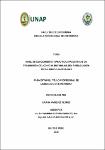Nivel de conocimiento y prácticas preventivas de transmisión del COVID-19 en familias del pueblo joven Túpac Amaru, Iquitos 2021
Abstract
The objective of the research was to determine the relationship between the level of knowledge and preventive practices in the transmission of COVID-19 in families of the young town of Tupac Amaru, Iquitos 2021. Methodology: the type of study was quantitative, descriptive, correlational; the design was nonexperimental, cross-sectional; population made up of 300 families and the sample of 108. The instruments were: questionnaire on the level of knowledge in COVID-19 (validity: 97.37%, reliability: 0.711; checklist of preventive practices (validity: 99.25%, reliability: 0.724 The results are: 48.1% families qualified with a high level of knowledge and 46.3% with a medium level, the
greatest knowledge was: concept, transmission, risk of infection, severe symptoms, most affected organ and outside care. from home, and the least knowledge was in: incubation period, environments where the virus lives, mild symptoms, medications; most families presented poor preventive practices; efficient practices were: use of a mask, washing food, feeding practice healthy, and the deficient ones were: hand washing before and after using the mask, antibacterial gel or alcohol at the entrance of the house, protection with the forearm or a handkerchief when coughing or sneezing, they do not let their h ouch people without a mask and avoid touching their eyes, nose and mouth while they are out of the house. No significant statistical relationship was found between the level of knowledge and preventive practices for the transmission
of COVID-19 (p=0.059; ?>0.05); concluding that the majority of families have a medium level of knowledge and poor preventive practices about the transmission of COVID-19. La investigación tuvo como objetivo determinar la relación entre nivel de conocimiento y prácticas preventivas en la transmisión del COVID-19 en familias del Pueblo Joven Túpac Amaru, Iquitos 2021. Metodología: el tipo de estudio fue cuantitativo, descriptivo, correlacional; el diseño fue no experimental, transversal; población conformada por 300 familias y la muestra por 108. Los instrumentos fueron: cuestionario sobre nivel de conocimiento en COVID-19 (validez: 97,37%, confiabilidad: 0,711; ficha de cotejo de prácticas preventivas (validez: 99,25%, confiabilidad: 0,724. Los resultados son: 48,1% familias calificaron con nivel de conocimiento alto y 46,3% con nivel medio; el mayor conocimiento fue: concepto, transmisión, riesgo de infección, síntomas graves, órgano más afectado y cuidados fuera de casa, y el menor conocimiento fue en: periodo de incubación, medios donde vive el virus, síntomas leves, medicamentos; la mayoría de familias presentaron prácticas preventivas deficientes; las prácticas eficientes fueron: uso de mascarilla, lavado de alimentos, práctica de alimentación sana, y las deficientes fueron: lavado de manos antes y después de usar la mascarilla, gel antibacterial o
alcohol a la entrada de casa, protección con el antebrazo o un pañuelo al toser o estornudar, no dejan entrar a su hogar a personas sin mascarilla y evitan tocarse los ojos, la nariz y la boca mientras están fuera de casa. No se encontró relación estadística significativa entre nivel de conocimiento y prácticas preventivas de transmisión del COVID-19 (p=0,059; ?>0,05); concluyendo que, la mayoría de familias tienen nivel de conocimiento medio y prácticas preventivas deficientes sobre la transmisión de COVID-19.
Collections
- Tesis [248]


